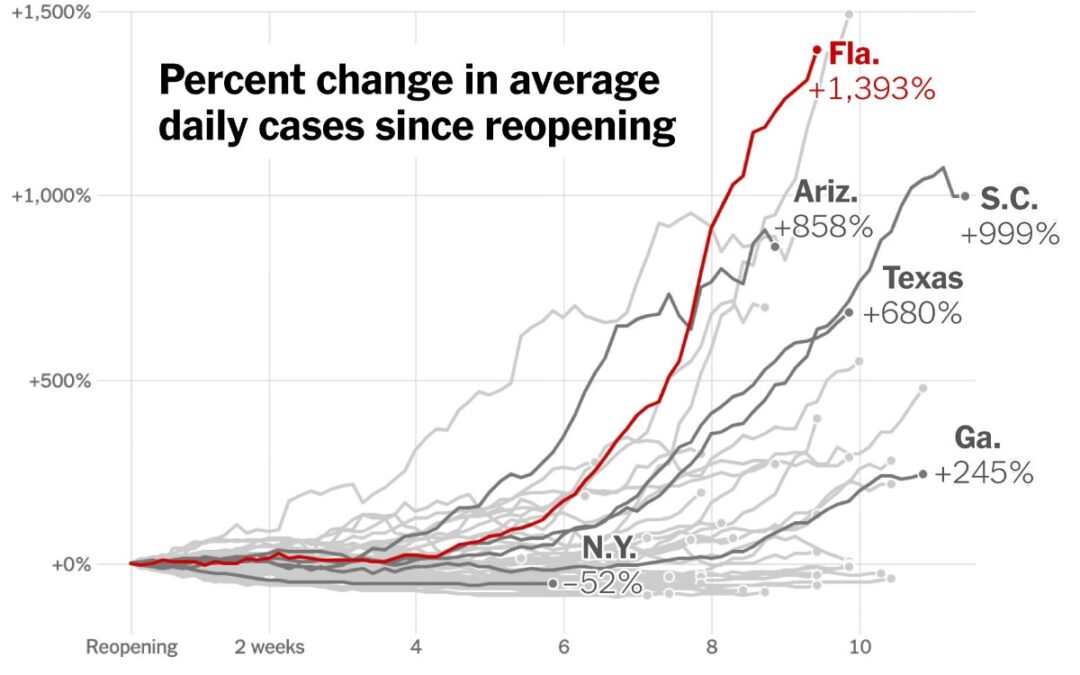The surge in coronavirus cases in the United States, which has set new daily-case records five times in the past nine days, is being driven largely by states that were among the first to ease virus restrictions as they moved to reopen their economies.
Florida has seen its average new daily cases increase more than tenfold since it began reopening in early May.
Cases in Arizona have jumped by 858 percent since beginning to reopen May 8.
Cases in Texas have risen by 680 percent since beginning to reopen May 1.
Epidemiologists had warned that reopening could lead to waves of new infections if it was done before the virus was contained, and before contact tracing was sufficiently ramped up enough to contain future outbreaks.
The trajectory taken by many states that pushed to reopen early offers a cautionary tale.
South Carolina, one of the first states to let retail stores reopen, has seen its average daily case count rise to 1,570, up from 143 from when the state began to reopen in late April, a 999 percent increase.
And in Georgia, where the governor’s moves to reopen swiftly in late April were criticized as too aggressive by President Trump — who had generally been pushing states to move faster to reopen — cases have risen by 245 percent.
Now the U.S. is debating when and how to reopen school classrooms — which Trump is pushing for strongly, even as school districts, teachers and some parents express concerns — and which steps should be taken by states that have become hot spots, from reimposing restrictions to ordering people to wear masks.
Many of the states that bore the brunt of cases in March and April but were slower to reopen have seen significant decreases in reported cases since. Average daily cases in New York are down 52 percent since the state began to reopen in late May, and they are down 83 percent in Massachusetts.
There are exceptions, though. California, once seen as a model for how to contain the virus, has seen an alarming increase in new cases, which are up 275 percent since May 25.
Florida, which has been grappling with a fast-growing outbreak, set a record today for the most deaths reported in a single day: 120.
That brought the state’s death count to above 4,000, the ninth highest tally in the nation.
And it raised concerns that the state, which has so far seen far fewer deaths than the states that saw the first spikes this spring, could be entering a deadlier phase.
Cases in the state have doubled since late June; today, the state reported more than 8,930 new cases.
Gov. Ron DeSantis, a Republican, said at a news conference today hat as testing has expanded, some labs have grown slow to return test results as they see a growing backlog of cases, leaving people unsure of whether to isolate while their test is being processed, particularly if they are not showing symptoms.
He said that the state was working to speed up the processing of tests for people with symptoms.
Even as the state continues to set records for new cases, and deaths, DeSantis continued to press for schools to reopen, which Trump has made a priority.
“If fast food and Walmart and Home Depot — and I do all that so I’m not, like, looking down on it — but if all that is essential, then educating our kids is absolutely essential,” he said. “And they have been put to the back of the line in some respects.”
The virus continues to upend life in Florida.
At one Miami television station, WPLG Local 10, at least nine employees, including a news anchor, have come down with Covid-19 or tested positive, and another 150 people linked to the station were awaiting test results.
The governor of Texas ordered an increase in hospital bed capacity in nearly 100 counties today, extending a ban on elective procedures to new corners of the state.
The move came a day after Texas crossed a grim milestone: On Wednesday, it recorded 119 deaths from the virus, the most in a single day in the state.
As of today, Texas had recorded more than 235,000 cases and more than 2,990 deaths.
The governor’s order directed hospitals to “postpone surgeries and procedures that are not immediately, medically necessary.”
The governor, Greg Abbott, had already issued a similar order in hard-hit counties that include the cities of San Antonio, Dallas, Houston and Austin.
Across the state, roughly 85 percent of the 7,300 intensive care beds were occupied as of Wednesday, according to the latest state figures.
More than 1,000 employees of the Transportation Security Administration have tested positive for the coronavirus, according to data released by the federal agency today.
Most of the employees — more than 900 — were airport screeners who have been on the front lines of interacting with travelers during the pandemic.
More than 640 of the employees have recovered while six have died, according to the agency.
Also today, the World Health Organization on Thursday formally acknowledged that droplets carrying the coronavirus may be airborne indoors and that people who spend long periods in crowded settings with inadequate ventilation may be at risk of becoming infected, a reversal that many scientists said was long overdue.
The agency also acknowledged unequivocally that the virus can be transmitted by people who do not have symptoms.
